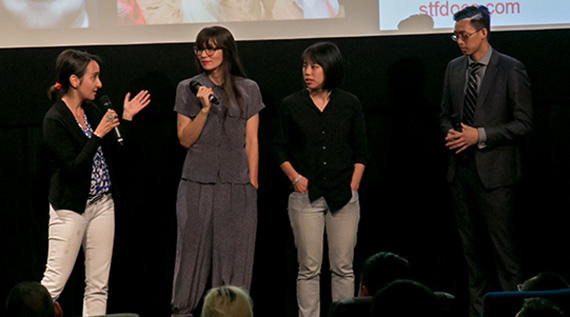
STF Executive Director Raphaela Neihausen in conversation with filmmaker Ursula Liang, editor Michelle Chang and film subject and athlete, Wayne Chow, following the screening of 9-MAN. © 8 Salamander Productions, Simon Luethi
This post was written by STF blogger Krystal Grow.
Sports journalist Ursula Liang waited for years for someone to recognize the phenomenon know as 9-Man in Chinatowns across North America, but eventually picked up a camera and started shooting herself.
Liang’s interest in 9-man volleyball is both personal and objective. As a German-Chinese sports journalist whose brother was deeply involved in the game and the community that surrounded it, she sensed the drama on the blacktop courts and empty parking lots where most 9-man games are played. She was invested in the culture surrounding the game, but with no allegiance to any particular team, she was able to tell a bigger story in her film – one about Chinese-American identity, the unique history of Chinese immigrants and their struggles to establish something truly their own.
In her first film, Liang dives into a distinctly Chinese-American game that has exploded into a community of dedicated players striving to maintain a connection to their culture. Logistically speaking, the rules of 9-man are more rigid and complicated than a standard, 6-person volleyball. Though players don’t rotate positions, they can make contact the with the ball twice in a row. While these variations have attracted volleyball players from around the world, it’s another set of rules that have remained a key point of contention among and outside the 9-man community.
‘Content rules,’ as defined by a group of 9-man elders and passed on through the generations, states that only Asian Americans are allowed to play. There are various percentage rules that define which position a player can occupy, and if a player’s racial integrity is questioned, they must present proof of their Asian heritage to tournament officials or be barred from the court.
Liang said the content rules were initially enacted to maintain the cultural significance of the game, which originated during the early days of Chinese immigration to North America as a way for Chinese men to build community during a bleak period of Chinese-American history. As the years have passed, younger generations of Chinese men, who spend their lives outside the tight-knit Chinatown community, see 9-man as a way to reconnect.
The cultural significance of 9-man makes the annual Labor Day tournament far more than a game. It is a yearly statement of the game’s legacy and the feverish loyalty of the men who play. By following a few select teams from their off-season practices through the final round of the grueling 4-day tournament, Liang captures the elements that make the best sports movie riveting, and the most effective documentaries captivating: drama, suspense, surprise and characters the audience can truly root for.
FULL Q&A
Raphaela Neihausen: How did you come to know about 9-man, how did you start shooting this film, and how did you come to this project?
Ursula Liang: My brother played 9-man. He played a lot of sports and so did I, but when I saw him play this sport, I saw the importance it took in his life. He came to it in his 20s, and the 9-man community became incredibly important to him. I saw that there was something else there greater than just a sport. I’d been a print journalist for most of my life, and this is my first film.
Neihausen: Let’s clap for that.







